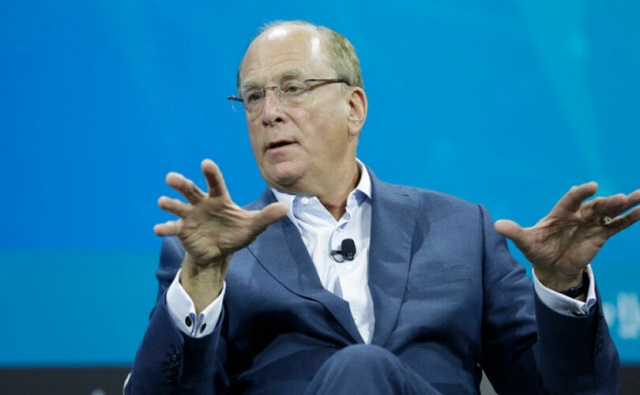Business
BlackRock’s woke capitalist vision is failing: here’s why

Larry Fink, New York Times DealBook 2022. Thos Robinson/Getty Images for The New York Times
From LifeSiteNews
By Frank Wright
Corbett shows how public outrage at the unelected political power of asset managers has led to an investor backlash, with politicians and legislators taking steps against the “forcing of behaviors” which BlackRock CEO Larry Fink once trumpeted as his mission
The always engaging James Corbett has produced some of the most informative guides to the power of BlackRock – who together with second-placed Vanguard Group own a combined 15 trillion U.S. dollars of assets under management.
In this report I relate how Corbett argues for a fightback against BlackRock and the asset management giants like them, who use their power to shape the world regardless of public consent. His views are more than corroborated by the news which followed the release of his video.
Corbett’s September 21 presentation, “How to Defeat BlackRock,” followed up by his excellent, “How BlackRock Conquered the World,” begins with some very encouraging news about the fortunes of the global investment giants – and what can be done to stop them. Happily, this process is already underway.
Corbett shows how public outrage at the unelected political power of asset managers has led to an investor backlash, with politicians and legislators taking steps against the “forcing of behaviors” which BlackRock CEO Larry Fink once trumpeted as his mission.
According to Corbett, and a growing number of other sources, this pressure looks likely to force asset management giants like BlackRock out of the behavior business altogether.
READ: How Vanguard and BlackRock took control of the global economy
A faltering global agenda
The first piece of good news is that the brand of ESG (environmental, social and governance) is so toxic that not even BlackRock’s CEO wants to use it any more.
BlackRock, under the leadership of Larry Fink, has used its immense wealth for years to compel companies to adopt the ESG agenda, becoming the driving force of “woke” capitalism. Yet leveraging financial power to force social and political change in this way has led to a backlash – from the general public, from lawmakers – and from the financial sector itself.
Last December, the North Carolina State Treasurer Dale R. Folwell called for Fink’s resignation, threatening to withdraw over $14 billion in state funds from the investment firm. As The Daily Mail reported, Folwell said:
Fink is in ‘pursuit of a political agenda… A focus on ESG is not a focus on returns and potentially could force us to violate our own fiduciary duty.’
Six months later, in June 2023, Fink said he was “ashamed” of ESG which he said had become “politically weaponized.”
Though his company, BlackRock, has continued to rate businesses on the same criteria, it has removed almost every mention of the term from its communications.
Speaking in Aspen, Colorado, Fink admitted that the decision of Florida Governor Ron DeSantis to withdraw $2 billion in state assets managed by BlackRock had hurt the company. The ESG agenda advanced by BlackRock is so beleaguered, even its former champion will not speak its name.
The power of public opinion
What this shows, as Corbett argues, is a further piece of good news: that public opinion still matters. It is public knowledge of the unelected political meddling of BlackRock and others which has led to outrage – and to action.
As a result of extensive coverage – mainly from independent media – of the nefarious influence of his company, Larry Fink has faced sustained criticism for over a year. This in turn has led to the kind of legal and financial consequences which have made people like Fink think again.
READ: How Larry Fink uses ESG and AI to control the world’s money
This also shows why so much money is invested in propaganda, censorship and “narrative control.” Governments and corporations are afraid of a well-informed public, because such a public is very likely to demand they are held to account.
The case of BlackRock not only shows that what is in your mind can indeed matter, but also that the goliaths of globalism do not always win.
This is one reason for the ongoing information war, and the growing censorship-industrial complex. An informed citizenry has the power to hold the powerful to account. Taken together, public outrage can also move markets – and the money men who watch them.
I investigated some of the claims Corbett made about the financial world’s mounting unease with the involvement of BlackRock, Vanguard and other firms in pushing unelected political and social change. I found more cause for celebration than even Corbett himself would admit at the time.
Passive investments, legal actions
In further good news, mounting legal troubles have accompanied the practice of companies like BlackRock, Vanguard and State Street to leverage their enormous asset piles into social and political compliance engineering.
According to a June 2023 report from RIAbiz, an online journal for registered investment advisers (RIAs), BlackRock and Vanguard’s “fooling around” with ESG targets has left them exposed to prosecution.
The business of managing many assets is supposed to be “passive” – a legal term which means that companies such as BlackRock are prohibited from “exercising control” of the companies whose funds they manage.
Federal exemptions had been granted to these asset management giants, but their habit of forcing behaviors on issues such as carbon “net zero” and “diversity” has placed their capacity to do business in jeopardy.
In May of this year, BlackRock and Vanguard saw a legal challenge emerge, and one which not only deters investors, but may also lead to their being broken up.
As Oisin Breen reported on June 1:
Seventeen AGs moved on May 10 against BlackRock on the grounds that its climate-based activism and its pro-ethical, governance and social (ESG) stance make it an active investor, in breach of a FERC antitrust agreement.
The Federal Energy Regulatory Commission (FERC) is involved due to BlackRock’s – and Vanguard’s – holdings in domestic energy utilities. Breen continues:
Separately, 13 AGs filed a motion to block Vanguard from renewing its FERC exemption. They represent mostly energy-producing states like Texas, as do the 17 now pressing to have BlackRock’s exemption revoked.
Though Breen concluded that both firms had “won a reprieve” from immediate legal censure, the message appears to have been received.
Three months later, Fortune magazine reported:
Finance giants BlackRock and Vanguard – once ESG’s biggest proponents – seem to be reversing course.
Hitting the bottom line
The global business publication noted the legal complications of mixing finance with social, environmental and governance policies, saying:
It appears these strategic shifts are being driven by a combination of public backlash and a focus on their bottom lines.
Then, on October 23, leading U.S. insurance brokerage WTW reported that BlackRock, Vanguard and State Street had all seen significant drops in their total amounts of assets under management (AUM). BlackRock’s alone fell from over 10 trillion dollars to just over 8 trillion.
By October 31, Fortune returned with the verdict that BlackRock, Vanguard and State Street had all “turned against environment and social proposals… in a clear sign of backlash.”
Their report noted a “precipitous” fall in the support of all three asset giants’ commitment to these agendas – with BlackRock’s funding of “ESG” measures falling by over 30 percent from 2021.
Real world consequences
This is the delayed result of a reality which BlackRock themselves acknowledged – and one which drove much of the public disapproval – that the ESG agenda was an economic and social wrecking ball.
Remarkably, BlackRock itself admitted that its promotion of ESG, in the aggressive pursuit of net zero and diversity policies, had actually contributed to a severe economic downturn.
In its “2023 Outlook,” the asset giant said these initiatives had been a major factor in ending the decades-long period of prosperity in the West known as the Great Moderation.
READ: The End of Prosperity? How BlackRock manipulates the West’s economic downturn
Buycotts – not boycotts
In his video Corbett is frank about the limitations of individual consumer power. You cannot “access BlackRock directly,” as it is a management firm. You can, of course, withdraw support from the companies in which it and its fellow behemoths Vanguard and State Street have holdings.
Yet Corbett moves from boycotts of individual corporations to the intriguing concept of “buycotts.” What he means by this is “taking your money from the corporations and using it to build things you want to see.”
How realistic is this solution? Already, businesses are emerging to capitalize on growing public discontent with what is done with their money – without their consent or approval.
Changing our behaviors – for good
The investment platform Reverberate, for example, allows users to “Rate companies highly (over 2.5 stars) if they make your life better, or lower if they make your life worse.”
What is more, user feedback from the public will determine which shares it buys:
Our publicly-traded investment fund buys shares of companies whose average ratings are high and/or rising, and sells shares of those whose average ratings are low and/or falling.
On their website, Reverberate says:
This is our way of trying to align capital allocation with the interests of the general public, as estimated by us in a relatively unbiased, wide-reaching way.
The decline of the asset managers’ ESG agenda is a happy corrective to the damaging belief that nothing can be done about anything.
It shows how well-informed public opinion can lead to genuine change, and with some of Corbett’s insights, how we can move from complaint to constructive action in making a better world.
You can see Corbett’s entertaining case for countering the woke asset management giants here.
Business
Musk Slashes DOGE Savings Forecast By 85%


From the Daily Caller News Foundation
By Thomas English
Elon Musk announced Thursday that the Department of Government Efficiency (DOGE) is now targeting $150 billion in federal savings for fiscal year 2026 — dramatically scaling back earlier claims of slashing as much as $2 trillion.
Musk initially projected DOGE would deliver $2 trillion in savings by targeting government waste, fraud and abuse. That figure was halved to $1 trillion earlier this year, but Musk walked it back again at Thursday’s Cabinet meeting, saying the revised $150 billion projection will “result in better services for the American people” and ensure federal spending “in a way that is sensible and fair and good.”
“I’m excited to announce we anticipate saving in FY ’26 from a reduction of waste and fraud a reduction of $150 billion dollars,” Musk said. “And some of it is just absurd, like, people getting unemployment insurance who haven’t been born yet. I mean, I think anyone can appreciate — I mean, come on, that’s just crazy.”
The announcement marks the latest in a string of revised projections from Musk, who has become the face of President Donald Trump’s aggressive federal efficiency agenda.
“Your people are fantastic,” the president responded. “In fact, hopefully they’ll stay around for the long haul. We’d like to keep as many as we can. They’re great — smart, sharp, finding things that nobody would have thought of.”
Musk originally floated the $2 trillion figure during campaign appearances last fall.
“I think we could do at least $2 trillion,” Musk said at the Madison Square Garden campaign rally in November. “At the end of the day, you’re being taxed — all government spending is taxation … Your money is being wasted, and the Department of Government Efficiency is going to fix that.”
By January, he softened expectations to a “really quite achievable” $1 trillion target before downsizing that figure again this week.
“Our goal is to reduce the deficit by a trillion dollars,” Musk told Fox News’ Bret Baier “Looked at in total federal spending, to drop the federal spending from $7 trillion to $6 trillion by eliminating waste, fraud and abuse … Which seems really quite achievable.”
DOGE’s website, which tracks cost-saving initiatives and contract cancellations, currently calculates total federal savings at $150 billion.
2025 Federal Election
Taxpayers urge federal party leaders to drop home sale reporting to CRA

Party leaders must clarify position on home equity tax
The Canadian Taxpayers Federation is calling on all party leaders to prove they’re against home equity taxes by pledging to immediately remove the Canada Revenue Agency reporting requirement on the sale of primary residences.
“Canadians rely on the sale of their homes to pay for their golden years,” said Carson Binda, CTF B.C. Director. “After the government spent hundreds of thousands of dollars flirting with home taxes, taxpayers need party leaders to prove they won’t tax our homes by removing the CRA reporting requirement.”
Right now, the profit you make from selling your home is exempt from the capital gains tax. However, in 2016, the federal government mandated that Canadians report the sale of their homes to the CRA, even though it’s tax exempt.
The Canada Mortgage and Housing Corporation also spent at least $450,000 to study and influence public opinion in favour of home equity taxes. The report recommended a home equity tax targeting the “housing wealth windfalls gained by many homeowners while they sleep and watch TV.”
“A home equity tax would hurt seniors saving for their golden years and make homes more expensive for younger generations,” Binda said. “If the federal government isn’t planning on imposing a home equity tax, then Canadians shouldn’t be forced to report the sale of their home to the CRA.”
-

 2025 Federal Election2 days ago
2025 Federal Election2 days agoResearchers Link China’s Intelligence and Elite Influence Arms to B.C. Government, Liberal Party, and Trudeau-Appointed Senator
-

 Business2 days ago
Business2 days agoTimeline: Panama Canal Politics, Policy, and Tensions
-

 COVID-192 days ago
COVID-192 days agoFauci, top COVID officials have criminal referral requests filed against them in 7 states
-

 2025 Federal Election2 days ago
2025 Federal Election2 days agoPoilievre Announces Plan To Cut Taxes By $100,000 Per Home
-

 Health2 days ago
Health2 days agoRFK Jr. Shuts Down Measles Scare in His First Network Interview as HHS Secretary
-

 Health2 days ago
Health2 days agoRed Deer Hospital Lottery – Previous Supporter Draw Deadline!
-

 International2 days ago
International2 days agoTrump White House will ignore reporter emails that include ‘preferred pronouns’ in signature
-

 Bjorn Lomborg2 days ago
Bjorn Lomborg2 days agoThe stupidity of Net Zero | Bjorn Lomborg on how climate alarmism leads to economic crisis






